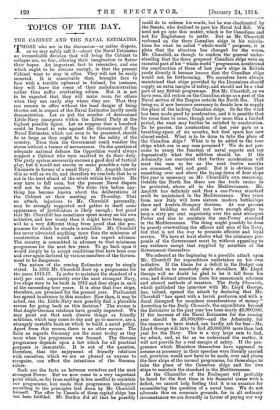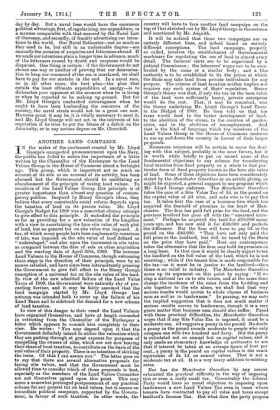TOPICS OF THE DAY.
THE CABINET AND THE NAVAL ESTIMATES.
WHOSE who see in the discussion—or rather dispute, 1 as we may safely call it—about the Naval Estimates an irremediable division that will bring the Cabinet to collapse are, we fear, allowing their imagination to flatter their hopes. An important fact to remember, and one which ought to be obvious enough, is that the present Cabinet want to stay in office. They will not be easily removed. It is conceivable that, brought face to face with a terrible upheaval in Ireland, for instance, they will leave the scene of their maladministration rather than suffer everlasting odium. But it is not to be expected that they will make room for others when they can easily stay where they are. That they can remain in office without the least danger of being thrown out in respect of the Naval Estimates hardly needs demonstration. Let us put the number of determined Little-Navy insurgents within the Liberal Party at the highest possible figure. Let us suppose that a hundred could be found to vote against the Government if the Naval Estimates, which are soon to be presented, should be as large as they ought to be for the safety of the country. Even then the Government could weather the storm without a tremor of nervousness. On the question of adequate national defence the Opposition would always support a Cabinet who were resolved to do their duty. The party system necessarily excuses a good deal of tactical play, but it would not excuse or make possible a vote by Unionists in favour of a small Navy. Mr. Asquith knows this as well as we do, and therefore we conclude that he is not in the least afraid of the revolt within his ranks. He may have to fall soon, but the present Naval dispute will not be the occasion. We write this before any- thing has become known about the deliberations of the Cabinet at their meeting on Thursday. That an attack, injurious to Mr. Churchill personally, may be strongly supported and gather to itself some appearance of justification is likely enough ; but proof that Mr. Churchill has sometimes spent money on his own initiative, and less wisely than it might have been spent, will be a very different thing from proof that the pro- gramme for which he stands is assailable. Mr. Churchill has never advocated anything more than the minimum of construction that would satisfy his expert advisers. The country is committed in advance to that minimum programme for the next few years. To go back upon it would simply be to accept conditions that have been over and over again declared by various members of the Govern- ment to be dangerous.
The nature of the coming Estimates may be simply stated. In 1912 Mr. Churchill drew up a programme for the years 1913-17. In order to maintain the standard of a sixty per cent, superiority over the next strongest Navy, five ships were to be built in 1913 and four ships in each of the succeeding four years. It is clear that four ships, therefore, are promised for the present year. Parliament has agreed in advance to this number. How then, it may be asked, can the Little-Navy men possibly find a plausible excuse for going back on this decision ? The excuse is that Anglo-German relations have greatly improved. We may point out that such elusive things as friendly relations, which may come to-day and go to-morrow, are a strangely unstable basis on which to build a naval policy. Apart from this reason, there is no other excuse. The facts as regards Germany are the same to-day as they were when the programme was framed. The German programme depends upon a law which for all practical purposes is immutable. It is out of the question, therefore, that the enjoyment of friendly relations with ourselves, which we are as pleased as anyone to recognize, can affect the intentions of the German rulers.
Such are the facts as between ourselves and the next strongest Power. But we now come to a very important point which, so far from making it less needful to maintain our programme, has made that programme inadequate according to the principles laid down by Mr. Churchill himself. The offer by Canada of three capital ships has not been fulfilled. Mr. Borden did all that he possibly could do to redeem his words, but he was checkmated by the Senate, who declined to pass his Naval Aid Bill. We need not go into this matter, which is for Canadians and not for Englishmen to settle. But as Mr. Churchill reckoned on the three Canadian ships in his calcula- tions for what he called "whole-world" purposes, it is plain that the situation has changed for the worse. Mr. Churchill, as though to confirm the general under- standing that the three proposed Canadian ships were an essential part of his "whole-world "programme, accelerated the construction of three of last year's ships in British yards directly it became known that the Canadian ships would not be forthcoming. We ourselves have always maintained that ships provided by the Dominions should supply an extra margin of safety, and should not be a vital part of any British programme. But Mr. Churchill, as we have seen, did reckon on the Canadian ships as a part of the Naval service of the Empire outside the North Sea. That being so, it now becomes necessary to decide how to supply the place of the lacking Canadian ships. So far the want has been made good by acceleration, and it is possible that for some time to come, though not for more than a limited period, the want may further be satisfied by acceleration. To be precise, the acceleration of last year gave us a breathing-space of six months, but that space has now almost ended. What is to be done to take the place of the Canadian ships ? What is to be added to the four ships which are in any case promised ? We do not pre- sume to usurp the function of naval experts and say dogmatically what the addition should be. If the Admiralty are convinced that further acceleration will meet the case so far as the next twelve months are concerned, well and good. But it is obvious that something over and above the laying down of four ships this year is necessary on Mr. Churchill's own reasoning. Outside the North Sea there are the trade routes to be protected, above all in the Mediterranean. Mr. Asquith has definitely said that a one-Power standard must be maintained in the Mediterranean. Two years from now Italy will have sixteen modern battleships there and Austria-Hungary thirteen. At our present rate of building we shall not have enough ships to keep a sixty per cent, superiority over the next strongest Power and also to maintain the one-Power standard in the Mediterranean. The thing might possibly be done by grossly overworking the officers and men of the Navy, but that is not the way to promote efficient and loyal service. We have at least shown what the minimum pro- posals of the Government must be without appealing to any evidence except that supplied by members of the Government themselves.
We referred at the beginning to a possible attack upon Mr. Churchill for expenditure undertaken on his own initiative. If the blame for a deficit in the Budget can• be shifted on to somebody else's shoulders, Mr. Lloyd George will no doubt be glad to let it fall from his own, and distract attention from his uneconomic schemes and absurd methods of taxation. The Daily Chronicle, which published the interview with Mr. Lloyd George, has, indeed, opened the attack by declaring that Mr. Churchill "has spent with a lavish profusion and with a ducal disregard for mundane considerations of money." According to the Daily Chronicle, the expenditure beyond the Estimates in the past year has been nearly £5,000,000. If the increase of the Naval Estimates for the coming year should be X3,000,000—and the Admiralty, for the reasons we have stated, can hardly ask for less—Mr. Lloyd George will have to find £8,000,000 more than last year for the Navy. This is a very large sum to find, we admit, and, so far as we understand the matter, it will not provide for a real margin of safety. If the pro- gramme which Ministers themselves have appeared to assume as necessary in their speeches were literally carried out, provision would now have to be made, over and above the four ships of the normal programme, for three ships to take the place of the Canadian ships and for two ships to maintain the standard in the Mediterranean.
As the Chancellor of the Exchequer will probably be faced for the first time in his financial Career with a deficit, we cannot help feeling that it is an occasion for reconsidering the question of a naval loan. We do not advocate this on economic grounds, for in all ordinary circumstances we are devoutly in favour of paying our way
day by day. But a naval loan would have the enormous political advantage, first, of regularizing our expenditure, in a manner comparable with that ensured by the Naval Law of Germany, and secondly, of frankly advertising our inten- tions to the world. Our Naval Estimates—not so much as they used to be, but still in an undesirable degree—are annually the occasion of suspicion and bitterness abroad. If we made our intentions plain a longer time in advance, much of the bitterness caused by doubt and suspense would be dispersed. One thing is certain: if the Government do not choose one way or another of proving that our determina- tion to keep our command of the sea is unrelaxed, we shall have to pay for our mistake in the end. In a naval race, as in all other races, the best plan—the plan that entails the least ultimate expenditure of energy—is to dishearten your opponent at the moment when he is tiring or when he expected to be making up ground. But for Mr. Lloyd George's unabashed extravagance when he ought to have been husbanding the resources of the country, the naval strain would not be a great one now. However great it may be, it is vitally necessary to meet it, and Mr. Lloyd George will not act in the interests of his reputation if he tries to put the blame of a deficit on the Admiralty, or in any serious degree on Mr. Churchill.







































 Previous page
Previous page